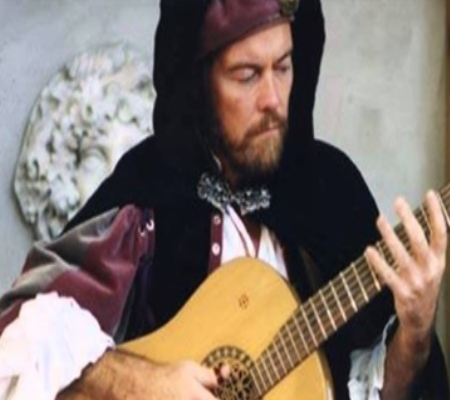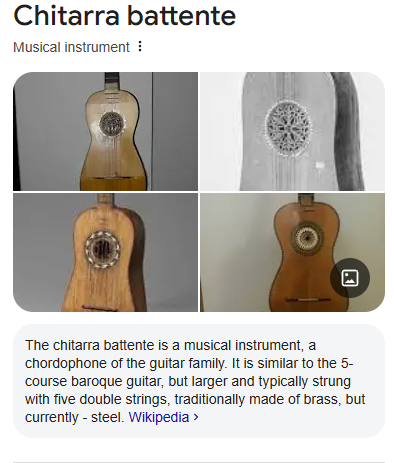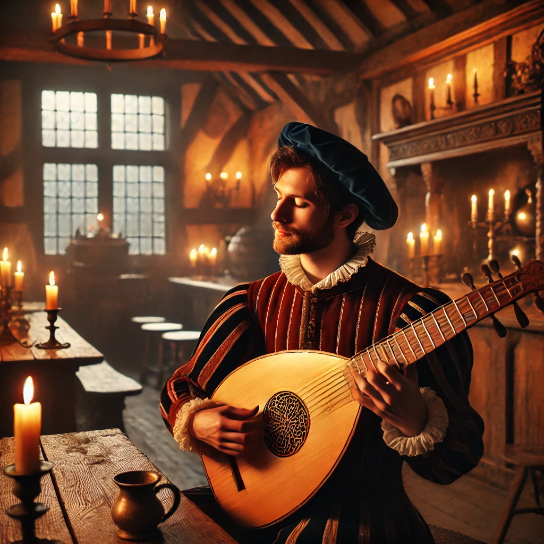Owain Phyfe: conversation with the time travelling troubador by Andrew Leigh

Our meeting place is a curious mixture of a low-class fast-food outlet and a medieval knocking shop. Blowsy maids serve large glasses of beer, and when I say I prefer water, the maid gives a disdainful snort of disapproval and flounces off.
Our meeting place is a curious mixture of a low-class fast-food outlet and a medieval knocking shop. Blowsy maids serve large glasses of beer, and when I say I prefer water, the maid gives a disdainful snort of disapproval and flounces off.
“Well, how can I help you- something about Renaissance Fairs?
Not exactly. I’m considering writing about them, especially since I’ve never been to one. Of course, you, Owain, live half your life in these strange places.
“True, not so much strange as different. I go there because it’s where people most appreciate my music. What can I tell you that you need to know?”
Owain Phyfe looks at me expectantly, his eyes twinkling like a man who knows a secret but won’t tell it outright. He sings songs from the Renaissance but brings them to vibrant life in our present age. He gives the kind of smile that suggests he already knows the first question I’m about to ask.
Thanks for agreeing to talk, Owain. I am a belated convert to your music, and I realise there’s a whole clan of people out there well ahead of me who are passionate about your singing. I never thought I’d warm to Renaissance music; it seems like such a throwback.
“I question labelling this music as a throwback. My whole aim is to help people today come to enjoy my kind of music, however old it may be.”
Owain, how did you begin mastering Renaissance music?
“I grew up in a bilingual family where we spoke Welsh as a second language. It fostered an early appreciation for diverse cultures and languages. My grandparents nurtured my passion for music and academic studies in languages, which led me to a career shift. In 1992, inspired by my travels to England, France, Mexico, and Spain and my experiences as a musician in New York City’s Greenwich Village, I sold my engineering business to pursue music full-time.
You began as an engineer, building machines and designing systems. Then one day, you walk away from that world and become a musician of another age. Why? “Ah, but isn’t music its own kind of engineering? A song is a structure, a blueprint of emotion built on rhythm and melody. I am constantly building—I choose to develop worlds instead of machines. When I perform, I’m indeed stepping into another time. And so is anyone who listens. The past is not gone, merely waiting for someone to call it forth. A song is a spell, and the walls between the centuries grow thin when sung.
There’s no shortage of musicians who perform early music, yet yours feels alive. What is your secret?
“I’m glad you use that word: alive. Too often, people treat old music as belonging in a museum, as if it were polished, precise, and lifeless. But these songs are not relics. They are voices of lovers, of soldiers, of the broken-hearted. If I sing them as though they belong to another age, they stay stuck in that age. If I sing them as though they belong to you, they live.”
What amazes me about your music, Owain, is your ability to sing naturally in so many languages”
“Yes, I made it a commitment to do that, so now I sing in seven languages: English, Spanish, French, Italian, German, Portuguese, and Latin. A multilingual repertoire lets me reach diverse audiences and create an immersive historical experience. Depending on the source material, I may even include additional languages. “
With such a wide range to choose from, does one speak to you most?
“They all have their own souls. Welsh is the language of my grandparents, and when I sing in it, I feel their voices beside mine. Italian is fire, Spanish is longing, French is poetry. But ultimately, music is the only language that truly matters.”

These Renaissance fairs are where many people discover your music. What makes them unique?
“Ah, the fairs! They are places where people permit themselves to believe in magic. For a few hours, they walk in another time. They let go of who they must be and become who they might have been. That is a rare and beautiful thing.”
You have reportedly said that music is storytelling. So, which song in your repertoire tells the most powerful story?
If I have to choose in terms of story, it would be Fortune My Foe. It is a lament, a song of fate turning its back on a man. Everyone has felt fortune slip through their fingers at some point. That is why it endures. That is why I sing it.”
You created Nightwatch Recording to promote Renaissance music. What do you hope to leave behind with it?
“Nightwatch Recording has been recording the music from the many Renaissance Festivals I perform at regularly. We aim to revive the spirit of the late medieval and renaissance repertoire. From the romanticism of the pre-Raphaelite paintings gracing our album covers to the poetry residing in ancient song, Nightwatch strives to revive the adventure, chivalry, discovery, and romance of early music in a way worthy of a second Renaissance.And these beloved songs, you understand, cannot be allowed to vanish. Many melodies have been passed from voice to voice for hundreds of years. If I do my part, maybe they’ll outlive me, too.”
Here’s something that I’d like to know, Owain. If you could play your music to any person in history, who would it be?Here’s something that I’d like to know, Owain. If you could play your music to any person in history, who would it be?
“Leonardo da Vinci. A man of vision, of curiosity, of endless creation. He would understand what I do. Perhaps he would even pick up a lute and join me.”
Yes, he was a true visionary, and I had a valuable meeting with him, which I have written about elsewhere. It was most enlightening. Your music has a devoted following, but did you ever wish for a larger audience?
The right people find my music. That is enough. That’s how it’s been through the ages, and that’s good enough for me. Now, let me ask you a question. What is your favourite Renaissance song?”
The answer won’t surprise you, Owain. I get off on Fugi, Fugi, Fugi, though I never discovered why we should flee.
“Ah! That’s the question. Why must we flee? The beauty of Fuggi, Fuggi, Fuggi, which means to flee, is that it doesn’t give just one answer—instead, the reason is left open to interpretation. Traditionally, it’s thought to be a song of escape from war, plague, or disaster, a call to leave behind destruction and seek refuge elsewhere.
In medieval and Renaissance times, such songs were typical; entire cities could be wiped out by war or disease, and people had to abandon everything they knew in search of safety. But then, there’s another way to hear it. Maybe it’s not just about a physical flight but an emotional or spiritual one. A plea to flee from sorrow, a broken heart, and a world that no longer feels like home. Flee from this sky—perhaps the sky has become too heavy and filled with grief or turmoil. There is something deeply human in that longing to escape, and that is why, even today, the song feels so modern.
“And that’s why I chose it to open the album it’s on. It sets the stage for a journey. We all flee something at some point in our lives. But the question remains: what are we running from, and where are we going?”
Do you think early music can still reach people in the modern world?
“Well, it reached you. It certainly reaches those I see at the festivals, and music is older than technology and language. People will always seek what is beautiful and timeless. The world may change, but the heart does not.”
This leads me to my final question: Owain. If you could leave behind one last song, what would it be?
“ Just one song? Then it has to be La Prima Vez, or The First Time. It’s a song of love, memory, and the moments that linger long after they are gone. Because in the end, we are all made of the songs we leave behind.
“And now I must fugi! I greatly enjoyed our Conversation and hope you’ll share it with as many people as possible. Though powerful, these songs still need all the help they can get.”
NOTE:
Born in 1949, Owain Phyfe became an American vocalist, instrumentalist, and composer renowned for his dedication to Renaissance and medieval music. Phyfe was proficient in traditional instruments, favouring the chitarra battente.

He also played recorders, viola, cello, fiddle, and harp. His music reached audiences worldwide and was played on over 250 radio stations across North America. Owain Phyfe passed away on September 5, 2012, from pancreatic cancer.His recordings survive him, along with the legacy of his impact on the appreciation and performance of early music.
Renaissance fairs, or Renaissance festivals, or faires if you feel fancy, are vibrant events that bring visitors back to the 1500s. They feature historical recreations, artisan crafts, period music, and theatrical performances. Inspiring festival-goers worldwide, these festivals have become extremely popular as they provide informative yet entertaining events.

The largest Renaissance fair in the United States, the Texas Renaissance Festival (USA) in Todd Mission, Texas, draws 600,000 guests annually. It takes place over eight weekends from October through November, including themed weekends, elaborate costumes, various performances, and culinary delights.
The Tewkesbury Medieval Festival in the UK is a medieval fair held over the second weekend of every July near Tewkesbury. Its highlight is an ever-re-enacted re-enactment of the 1471 Battle of Tewkesbury.

This is an imaginary conversation with Owain. While based on credible sources, it adopts the biographer’s license to create the dialogue. As its creator, I disclaim any responsibility for how others may subsequently use the material.
My new book, Conversations With Remarkable Women, is available on Amazon. In it, I talk with some 20 talented women, including Catherine the Great of Russia, Madam Tussauds, Marie Stopes of Birth Clinic fame, Coco Channel, and others.
My follow-up book, Conversations with Marvellous Muses, will be published mid-2025. Meet me at my website, which has constantly changing blogs, at https://www.andrewsbooks.site.
You can contact me at andrewsbooks@btinternet.com
© Andrew Leigh
